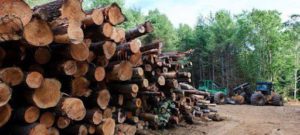New Hampshire is the 2nd most forested state, with 4.8 million acres of land occupied by forests for a total of 81% of all the land in the state. Though the forest area dropped by 35,000 acres in 1983, it hiked again between 1997 and 2007.
The common forest types in New Hampshire are northern hardwood, white pine, aspen-birch, red oak, spruce-fir, and hemlock. To maintain these forests, loggers and foresters follow best practices and understand soil conditions, climate, and elevation to determine ways to manage the forests.
All of this falls under the umbrella of forest management. In this guide, we’ve listed some of the benefits of forest management but before that, let’s understand forest management.
 Forest Management: What Is It?
Forest Management: What Is It?
A branch of forestry, forest management refers to the overall legal, social, administrative, and economic aspects of forests. The process involves planning and executing the forestry practices for the use of planted and natural forests to meet economic, cultural, environmental, and social objectives.
Active Forest Management
Forest management can be either custodial, where the landowner takes little to no action for designated Wilderness areas, or active forest management, where timber is intentionally guided in its regeneration, grown, and harvested continually.
Active forest management is important because well-managed and healthy forests are less susceptible to wildfires that may affect valuable habitat, homes, recreational areas, and overall quality of life. Foresters understand the need to manage the ecosystem, including wildlife, plant life, soils, and watersheds, to improve the health of forests and the habitat of wildlife.
Forest Succession
Forests undergo a predictable cycle and move through continual changes. This cycle is called succession. Succession is dynamic, and it allows foresters to control natural changes by slowing down or expediting the process with active management. Foresters use prescribed burning, thinning, and harvesting to shape the dynamic changes.
Even no management is also a conscious effort of foresters to allow for natural disturbances such as wind, fire, and diseases to trigger succession and make room for newer trees.
Benefits of Forest Management
Following are the benefits of active forest management in New Hampshire:
Environmental Benefits
Forest management protects wildlife habitat, addresses climate change problem, contributes to cleaner air, and reduce greenhouse emission. As a result, wildfire risk also drops because it tucks fossil fuel underground.
Research indicates that forest management offers carbon benefits. Managed and young-reserved forests remove or sequester approximately the same carbon amount from the atmosphere in standing trees. However, active forest management provides added advantage of offsetting fossil fuel by producing low-carbon from sawmill residues and forests. Fewer fossil fuel means lesser environmental degradation, higher firefighter safety, reduced carbon emission, and lesser wildfire intensity.
Active management also improves water quality because it cleans the water and makes it ready to use. The cover nurtures and protects the soil, which is key to the retention and filtering of water quality. Similarly, forest management improves air quality by absorbing additional carbon annually.
Social Benefits
Aside from the very many environmental benefits of forest management, it also improves social life. Forests serve as a great place for recreational activities in New Hampshire. Forests can be a place for nature photographers, birdwatches, skiers, campers, hikers, snowmobilers, and horseback riders.
Forest management also benefits urban communities by offsetting air pollution and reducing stormwater runoff; the urban communities can lead a quality life with reduced energy consumption.
Another social benefit of active forest management is the use of energy-efficient and renewable building projects. Unlike copper, steel, and iron which can be recycled and reused but not replaced, wood is a better alternative to building projects. As a renewable resource, it can be recycled, and by replanting forests, more timber can be harvested for energy-efficient building projects.
Economic Benefits
Forest management also boosts the economy in multiple ways. The economic impact of forest management is measured in number and monetary terms. It includes income, production value, and economic contribution of forest management to national economic, international trade, and energy supplies.
Active forest management increases employment which boosts per capita and household income. Similarly, the trade and processing of wood, timber products, and services also contribute to the environment. These products are used as raw materials for industrial and rural household use.
Get Logging Services in New Hampshire
If you’re looking for professional loggers in New Hampshire or Maine, you’re at the right place! At William A. Day Jr. & Sons, we offer logging services for your forest management projects. If you’re planning to take harvesting projects today or in the future, reach out to us. We have all the right equipment and experience to provide quality logging and wood harvesting services to you. Contact us for more information.
